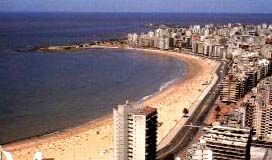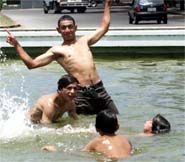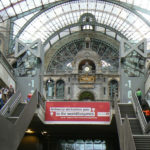(Updated July 2010)
Getting Away
Uruguay is a tiny oceanic country of 3.7 million people wedged between the two South American giants of Brazil and Argentina.  When the sun rises on the capital Montevideo, the city glows softly along the waterfront and its European architecture warms in the mild morning air. The traffic is light, huge cargo boats loaded with lumber chug out to sea, and the ferries bring vacationing Argentineans (“Portenos”) heading to Punte del Este.
When the sun rises on the capital Montevideo, the city glows softly along the waterfront and its European architecture warms in the mild morning air. The traffic is light, huge cargo boats loaded with lumber chug out to sea, and the ferries bring vacationing Argentineans (“Portenos”) heading to Punte del Este.
Fifty miles southeast along the coast from Montevideo, Punte del Este is kind of Palm Beach where the well healed from Argentina build their great summer mansions next to the Atlantic. The charge of life is gentle here: clean air, frequent sunshine, long sand-duned beaches and, more importantly to gay and lesbian visitors, a relaxed atmosphere away from the more formal strictures of Buenos Aires.
The ambience here is equal to any first-world seaside resort. It is an international port of call for round-the-world sailing yachts. In the village are casual cafes with rich croissants, an Internet venue, tourist and travel services and a range of eateries from Macdonald’s to haute. Long walks along the beaches are irresistible and the sand dunes stretch for miles allowing for privacy and quiet.
 This was all new to us; an accidental delight resulting from an invitation by our friend Carlo in Buenos Aires who often rents a condo in Punte del Este. It didn’t take much prompting as he described the balmy weather and the sandy scenery along the southeast coast of Uruguay.
This was all new to us; an accidental delight resulting from an invitation by our friend Carlo in Buenos Aires who often rents a condo in Punte del Este. It didn’t take much prompting as he described the balmy weather and the sandy scenery along the southeast coast of Uruguay.
From his perspective, Uruguay is a pleasure: nice weather, pleasant milieu, comfortable accommodations, good food, a chance to unwind from the intense pace of Buenos Aires–and an opportunity to see his boyfriends who live near Punte del Este. He has two Uruguayan ‘romanticos’ named Miguel and Ricky who live outside Punte del Este. The setting sounds ideal for romance and relaxation.
Illusions and Reality
But this image of insouciant tranquility is only partially accurate. This privileged lifestyle only for those who can afford it. More accurate is that most Uruguayans are disadvantaged men and women whose aspirations are caged by limited education, a sluggish economy and low paying work.  Outside Montevideo, the capital where most of the modest prosperity thrives, are countless small villages wallowing in the backwater of Latin American poverty. The homes are humble hovels, some still without running water or electricity as barefoot children run along unpaved streets.
Outside Montevideo, the capital where most of the modest prosperity thrives, are countless small villages wallowing in the backwater of Latin American poverty. The homes are humble hovels, some still without running water or electricity as barefoot children run along unpaved streets.
Miguel
Such are also the conditions where many gay and lesbian people live with their families. Miguel lives in a remote village a couple of hours from Punte del Este. With no car and no steady job he spends much of his time around his parents small house doing chores for his often-sick mother and helping with the younger nine kids. Only occasionally can his father afford to pay him for helping him load his truck when he hauls materials that vary from timber to wheat. At 21 there is little hope of prosperity for Miguel and little means to access a future any different from his present meager circumstances.
In contrast, Carlo is from a wealthy Argentinean family. He and Miguel met by accident one day at a market near Punt del Este where their eyes linked in the universal language of cruising. They were immediately drawn together, and after some words Carlo invited Miguel to ‘go for a swim’. Subsequently, they have seen each other a few times, in Uruguay mostly, and once in Buenos Aires for a weekend. It is an affair that has tossed their hearts and minds into erotic and social confusion.
Carlo is twenty years older than Miguel and is light years away in lifestyle. Carlo’s sophisticated world among the upper class country club set in the upscale suburb of San Isidro in Buenos Aires is something Miguel can hardly dream about. Although Carlo lives simply, he lives without want, flashing his credit card whenever a need arises. His accountant pays the bills.
This imbalance is disturbing for Carlos in his feelings toward Miguel who can never offer the maturity or stability that he craves in a mate. Without taxi fare or a high school diploma, the excitement of late night pleasure pales with the dawn when it’s time to organize the day: what to do with someone with nothing to do.
 Carlos goes daily to go to his yoga class and then to tennis and lunch at the club. Miguel can wait at Carlo’s house (does he trust him that much?) and watch TV until dinnertime. Will he prepare the meal for Carlo? Probably not, since Carlo already has a cook/housekeeper who does all that on the three days a week he goes to work at the company his father owns.
Carlos goes daily to go to his yoga class and then to tennis and lunch at the club. Miguel can wait at Carlo’s house (does he trust him that much?) and watch TV until dinnertime. Will he prepare the meal for Carlo? Probably not, since Carlo already has a cook/housekeeper who does all that on the three days a week he goes to work at the company his father owns.
And how would Miguel fit into this affluent Argentinean family system where gay is not a topic of discussion? Although Carlo’s family all know and accept (in silence) that he is gay, his affairs do not segue into the usual concerns of the family, such as his sister’s recent divorce. Presentable feelings of the heart are expected to be heterosexual and the family traditions are carried on by marriage.
And what does Miguel know of the complexity, responsibility and social life of an urban gay relationship from having lived in the impoverished confines of a tiny macho Catholic village. And, indeed, as Carlo sometimes wonders, does Miguel really know what gay is?
Carlo’s anguish is further confounded by this doubt: is Miguel really in love with him or with the grand fairytale life that Carlo might offer to Miguel’s anemic life where cheap alcohol blunts the hungry edges of life?
 Being gay is less of an issue in Uruguay than eating lunch. Personal fulfillment is only a privileged outsider’s indulgence. Finding a pair of socks without too many holes under a pile of shoddy clothes is more real, as is sleeping on a musty mattress with a younger brother, or sharing some bread and coffee for breakfast. These are the important matters that have focus for Miguel.
Being gay is less of an issue in Uruguay than eating lunch. Personal fulfillment is only a privileged outsider’s indulgence. Finding a pair of socks without too many holes under a pile of shoddy clothes is more real, as is sleeping on a musty mattress with a younger brother, or sharing some bread and coffee for breakfast. These are the important matters that have focus for Miguel.
But he doesn’t complain because there is no one to listen since his friends (most likely all straight) all share similar conditions. Carlo recalled the first night he spent with Miguel in his spacious three-bedroom condo next to the clear blue pool and manicured lawn. It didn’t take much prompting from Carlo for Miguel to pour out his long stifled feelings of despair and confusion, sobbing in Carlo’s arms before falling asleep.
Ricky
Ricky, at 21, is seems more mature than Miguel and lives in the area of Punte del Este so Carlos can easily drive to meet him. Although they have slept together on several occasions, Carlo still wonders about Ricky’s sexuality. “I don’t think he is completely gay”, he mused. Then he added, “but he could be. The way of life here in Uruguay is not so rigid as in Argentina. Guys here are not so strong in their behavior; sex with another guy is not the opposite of being with a girl”, Carlo observed with mixed feelings.
This was the first of several opinions I would hear about the Uruguayan ‘way’, an attitude about sexual behavior that is less categorical, less polarized than in other South American countries.
So, gay or bi, Ricky makes himself available to Carlo whenever he visits the good life in Punte del Este. They have sensual fun and eat in restaurants far beyond Ricky’s modest means. But Ricky does not open his heart like Miguel, possibly because his life is not as harsh or impoverished. Nor does Ricky seek to be invited to Carlos’ home in Buenos Aires, perhaps sensing the social and monetary discrepancies between the two of them. Wisely and cautiously protecting his own feelings, he also doesn’t seek Carlos’ heart, which may be why Carlos’ feels a stronger attraction to Ricky.
But the same incongruity exists for Carlo when he lets his heart go too far toward Ricky. There is no offered place at the table for a young Uruguayan lover in Carlo’s Catholic family or in the family business-or the country club.
 Adding to the complicated equation, Ricky recently revealed that he had fathered a child, although he attempted to reassure Carlo he was still interested in being a ‘special’ friend. Carlo felt his heart drop at this news while at the same time trying to be supportive of Ricky’s new role as father.
Adding to the complicated equation, Ricky recently revealed that he had fathered a child, although he attempted to reassure Carlo he was still interested in being a ‘special’ friend. Carlo felt his heart drop at this news while at the same time trying to be supportive of Ricky’s new role as father.
Listening to Carlo’s frustration, I felt equally sad for both of them; a poignant sympathy for the angst and anguish of magnetized men pulled apart by nationality, economics and social constructions.
Two Cultures-Different Attitudes
Uruguay and Argentina contrast in their attitudes about homosexuality. From several conversations with gay men from both countries I came to understand that the differences arose from the influence of three powerful sources: the military establishment, the Roman Catholic church and the brittle etiquette of the ruling upper class.
In Argentina, all three of these core cultural pillars have exerted a powerful force on the daily life and social milieu for generations. History there is especially replete with military behavior that has mostly served to torment and terrorize that country’s populace into submission. The word ‘Peronista’ still is fraught with ominous associations. As for the Church’s complicity in political affairs, there are few who think high-ranking clerics have clean hands while at the local parish level, personal freedom has always been framed by strict puritanical church dogma.
In Uruguay however neither the church nor the military have had the same driving influence and the presence of an elite class, with its formal proscriptions on proper behavior, is minimal since the resources of the country cannot support a large influential elite class. The trickle-down effect of these differences, in Uruguay, has been a softening of conservative values and a quiet liberalism that is discreet.
Working class indifference to such values as reputation or proper conduct allows for more relaxed attitudes. This includes a discernable easing of sexual inhibitions among unmarried men (and many who are married) with time on their hands. With less concern for manners, enhanced by unpretentious poverty, it’s not difficult to find guys–gay, straight or in between–willing to accommodate desiring partners, from home or abroad.
For the casual visitor, however, this insouciant coziness may be hard to interpret. “Gay sex may be a way for them to have fun or make friends. But it’s hard to say if it’s love, so I have to be careful”, said Carlo as he attempted to sort out his feelings for Ricky and Miguel. For other gay players in town for a few days and not looking for husbands, the relaxed sexual atmosphere makes for a comfortable occasion.
 This is not to suggest, on the other hand, that Uruguay is a sexually permissive culture. It is clearly a predominantly straight system that has slowly evolved to modern thinking especially during the 5-year tenure (2005-10) of the immediate past president President Tabare Vazquez who was known for a progressive attitude toward gay rights. He produced a sweeping tide of legislative change, making Uruguay a desirable country in which to be openly gay. The new President Mujica has yet to be tested on his stance on gay rights.
This is not to suggest, on the other hand, that Uruguay is a sexually permissive culture. It is clearly a predominantly straight system that has slowly evolved to modern thinking especially during the 5-year tenure (2005-10) of the immediate past president President Tabare Vazquez who was known for a progressive attitude toward gay rights. He produced a sweeping tide of legislative change, making Uruguay a desirable country in which to be openly gay. The new President Mujica has yet to be tested on his stance on gay rights.
Andreas
This subject came up unexpectedly a few days later on the return 2 1/2 hour ferry ride across the vast Rio del Plata river delta from Montevideo to Buenos Aires. I sat next to a friendly Uruguayan businessman in the import/export business, Andreas, about 37, educated in Uruguay’s free school and university system, was married with two young adult children.
We talked about Uruguay’s history over the past century, which has been noticeably different than it’s volatile and violent neighbors of Argentina and Brazil, He agreed about the strong control of the Catholic Church and military juntas in those countries.
In contrast, “Uruguay has only had one feeble military attempt to run the country, in the seventies, which failed”. Before and after that church and state have been separate for many decades resulting in a more secular Uruguayan modern tradition.
 Sexual attitudes have consequently developed into less rigid and fearful mindsets. Ambi-sexuality is more common here especially among younger men who tend to be more at ease and fluctuate between gay and straight on their way to maturity. Andreas appeared quite at ease discussing this topic; he also offered that it’s not unusual for young military recruits, especially from working class rural areas, to be seen cruising the streets on weekends looking for action–sometimes for a price.
Sexual attitudes have consequently developed into less rigid and fearful mindsets. Ambi-sexuality is more common here especially among younger men who tend to be more at ease and fluctuate between gay and straight on their way to maturity. Andreas appeared quite at ease discussing this topic; he also offered that it’s not unusual for young military recruits, especially from working class rural areas, to be seen cruising the streets on weekends looking for action–sometimes for a price.
So here too, in modern Uruguay, the universal themes of money and sex continue to ease the disenfranchised who lack other advantages for improving on their unlucky lot. It was quite an informative chat with a ‘typical’ Uruguayan businessman who was married with kids!
Eduardo
“It has not always been that way”, said Eduardo, a native of Uruguay who has lived with his long-term partner in California for many years. He recalls the harsh homophobia when he lived there when the military ruled (1973-85). “They tried to kill the homosexuals then and we had to hide everything. Many married gays led a double life…they still do, I think.” But he has not lived among native gays for years and admits that young people are now more open. “In Maldonado (near Punte del Este) I know they are very public and cruisy there. So things have changed.”
Hector
Another conversation about Uruguayan male sexuality was with Hector whom we first met up north at the Bolivian border as we waited to have our passports examined by a lethargic but suspicious patrolman. Exchanging e-mail addresses, we met two weeks later for a light evening meal in Buenos Aires.
Hector was 34 but seemed younger in his flirtatious and sensuous manner of talking. He was open with his thoughts and feelings, touching and laughing as he interacted with his friends and us.
 He happily commented that he and a friend sometimes go to Uruguay because holidays are both cheaper than Argentina and “the boys there are very sweet and easy.” He described how easy it is to pick up Uruguayan men on the streets, as they are naturally friendly and relaxed and receptive to sexual overtures.
He happily commented that he and a friend sometimes go to Uruguay because holidays are both cheaper than Argentina and “the boys there are very sweet and easy.” He described how easy it is to pick up Uruguayan men on the streets, as they are naturally friendly and relaxed and receptive to sexual overtures.
“They are not so afraid as we are here. It is a more relaxed country, so they are willing to go with you.” I asked if they expected to be paid for sex. “Not really. But they are very poor and you can buy them a little something, a gift or a nice dinner at a restaurant. Their attitudes are like Morocco; you can go with a man or a woman and it doesn’t matter–it’s private what you do.”
Hector also agreed that important differences between Argentina and Uruguay resulted from the influence of the Church and the military presence in government.
Casual Sex-Casual Attitudes
In Montevideo, young men and women go about their business of school, work, TV, drinking, cafe life, or just hanging out with peers to check out the girls or guys at the local plaza. The ‘Ciudad Vieja’ (old town) looks like a once-glorious outdoor museum of European architecture that has been sadly neglected for too many years.
Although private companies have restored some of the beautiful ornate buildings and the central plazas are tidy, a walk along the side streets still reveals the weak economy here. A few of the magnificent Spanish and French neoclassical buildings constructed in the eighteenth and nineteenth and centuries are in need of repair.
Over the past hundred years many unredeemable masterpieces have been usurped by twentieth century socialist-looking structures housing offices and  government functions. There are five large plazas along the main commercial artery each with it historic church or mix of new and old buildings. These grassy oases offer shady seating at cafes or benches for people watching.
government functions. There are five large plazas along the main commercial artery each with it historic church or mix of new and old buildings. These grassy oases offer shady seating at cafes or benches for people watching.
Just south of downtown are long stretches of beach lined with middle class high rise apartments. As may be expected, there is a gay friendly stretch called Furiferia where curious and eager Uruguayans can exchange looks and favors. Sometimes they get lucky for more than an hour and strike up friendships with Argentineans with cash and a nice condo in Punte del Este.
From there it’s a guessing game to sort out the covert motives and complex feelings that transfer between two strangers. For some, it’s easy: they are gay and want an ongoing relationship with a lover. For others it’s a pleasant game, and still others a possible escape to a better life. In surprising Uruguay a curious visitor can be pleased–or confused–by Eros.
Also see:
Gay Uruguay News & Reports 2000 to present
Gay Uruguay Photo Gallery















